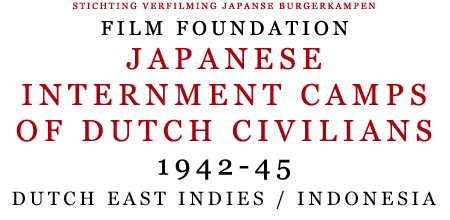
 The Foundation
Current
Films, Publications
Additional websites
The Foundation
Current
Films, Publications
Additional websites

> Project History
A docudrama on Japanese civilian internment camps 1942-45
For those interned in Japanese civilian internment camps in World War II in Southeast Asia, the past is as vividly present as ever. After more than sixty years adults and children are still carrying the burden of the horrors experienced in Japanese camps..
This period has been extensively documented, especially in the much quoted dissertation by dr. D. van Velden, De Japanse interneringskampen voor burgers gedurende de Tweede Wereldoorlog (1963, 1977) [Japanese civilian internment camps during World War II]
[Japanese civilian internment camps during World War II], and the two parts of the Ge√Įllustreerde atlas van de Japanse kampen in Nederlands-Indi√ę 1942-1945 (2000-2002) [Illustrated atlas of Japanese camps in the Netherlands East Indies 1942-1945].
Countless more publications about the various camps in particular have been published, be it as diaries or other personal memories. The period of the Japanese occupation and the internment camps has also been covered by photography, especially comprehensively in the aforementioned illustrated atlas. Movie material however is extremely rare. There are some short films covering internment camps, but these, as is the case with the available photographs, had been shot only after Japan's capitulation. They thus provide a rather unrealistic image of life in the camps: the war was over, food had been relatively plentiful for some time, and no Japanese are to be seen in these pictures.
Thus the available film materials are wholly inadequate for keeping the memory of these internment camps alive. The Stichting Verfilming Japanse Burgerkampen 1942-45, established in 2006, co-founded by actress / movie director Willeke van Ammelrooy, wants to meet this need and defines its mission as follows: To use film, be it drama, documentary, or docudrama, to bring the memories to life of what civilians experienced during Japan's occupation of what was then Netherlands East Indies, especially highlighting their struggle to maintain both their physical and their mental integrity. An application for subsidy from the Stichting Het Gebaar [Foundation The Gesture] was eventually honored on 18 January 2007.